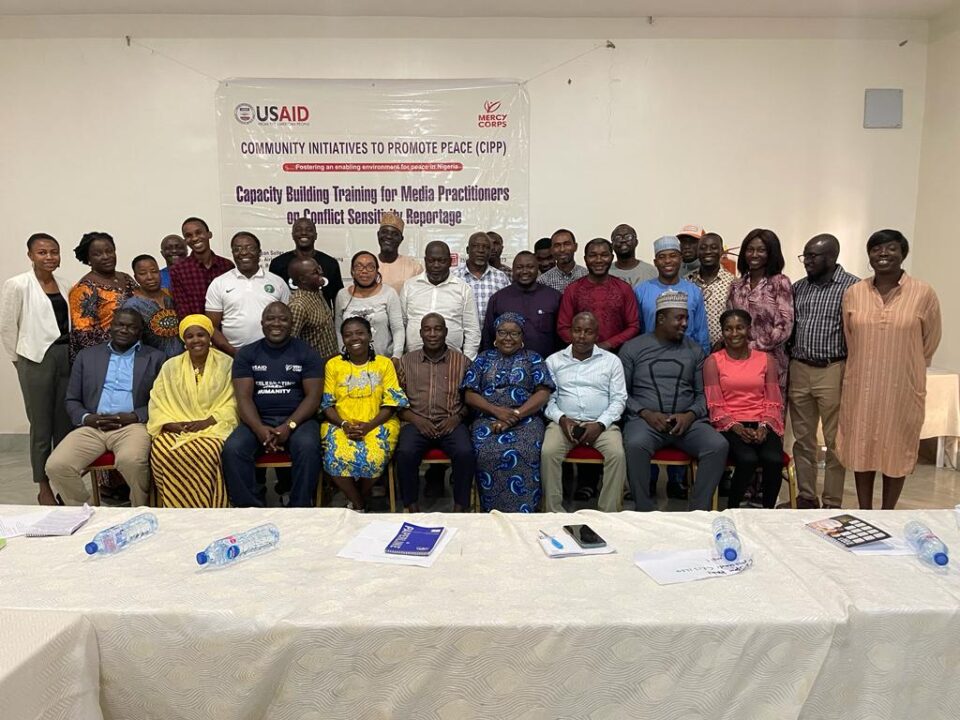In a concerted effort to foster peace and promote conflict-sensitive reportage, media practitioners and key stakeholders recently came together for a two-day capacity-building training in Plateau State. The training, organized by the United States Aid (USAID) and Mercy Corps, was a part of the Community Initiatives To Promote Peace (CIPP) project.
Held in collaboration with the Interfaith Mediation Centre (IMC), ARDA, PARE, Savannah Center (SCDDD), and the Social Justice and Humanitarian Development for Peace Initiative, the event took place at Crispan Hotel in Jos on 25th and 26th, July 2023.

The intensive training sessions focused on sensitizing participants about the significance of objective and peaceful reporting, with an emphasis on avoiding actions that could fuel conflicts in Plateau State.
Mr. Godwin Okoko, the Mercy Corps conflicts Technical adviser for the CIPP project, played a pivotal role in leading the session on conflict analysis. He stressed the importance of understanding all perspectives and the underlying causes of conflicts. The training also emphasized building confidence among stakeholders and appreciating the cultural context while presenting positive narratives and addressing negative aspects in media reports.
“Conflict reportage should delve into the causes, actors, and dynamics of the conflict. This understanding will enable developmental and peace-building organizations to better grasp the context in which they operate and their role in mitigating conflicts,” highlighted Mr. Okoko.
During the training, Gyang Bere, the director of press to the Governor of Plateau State, delivered a heartfelt message, acknowledging the influential role journalists play in shaping public opinions and perceptions. Bello stressed the importance of recognizing early warning signals to prevent conflicts and urged media practitioners to be mindful of their impact on the community.
“Governor Mutfwang envisions a peaceful Plateau, where people can coexist in unity, regardless of their diverse backgrounds,” added Bello.
Representatives from participating organizations also emphasized the significance of responsible reporting in contributing to peace-building efforts. Mr Gayi Timothy Gayi, the Acting Director General of the Plateau Peace-Building Agency (PPBA) acknowledged the media’s role in their past successes and encouraged participants to use their platforms to help reduce tension in the state.
Addressing the challenges faced in security reporting, Brig-Gen. Gakji Shipi RTD, the special adviser to the Governor on security matters, called for balanced and sensitive reporting. He emphasized the importance of approaching criticism with a constructive and compassionate approach, rather than resorting to hostile language.
“One of the challenges in security reporting is how encountered threats are labeled and interpreted. Sometimes, non-religious issues are mistakenly portrayed as religious crises in media reports. The lack of balance in reporting and disregard for national security and consequences are also concerning,” noted Shipi.
Mrs. Kaneng Tabitha, the State Director of the National Orientation Agency, emphasized the gravity of the challenges faced in Plateau and assured the public of the agency’s commitment to ensuring accurate and responsible transmission of information.
Taiye Dashin, the Program Officer for the CIPP program, expounded on the project’s objectives, which aim to empower communities to promote peace and facilitate sustainable conditions for lasting harmony. Dashin highlighted the crucial role of the media in shaping narratives that can either fuel or prevent conflicts.
Dashin added, “We believe that most narratives can either fuel or mitigate conflicts, which is why the role of the media is so important. Every piece of information is valuable and contributes to the larger picture.”
Throughout the training, participants engaged in group discussions, focusing on the challenges faced in reporting conflict situations in specific Plateau communities, such as Mangu, Reom, and Bassa. They also provided recommendations in the form of dramatic presentations.
Mr. Godwin Okoko, the Mercy Corp conflicts ethical adviser for the CIPP program, expressed his satisfaction with the participants’ dedication to peace-oriented reporting.
He said, “I am filled with joy knowing that we have passionate individuals who have earnestly committed themselves to fortifying peace structures and promoting social harmony through the inception of the plateau peace media network.”
“Our aspiration extends beyond the mere establishment of this group; we expect them to sustain the momentum. They will play a crucial role in advocating for peace, raising awareness, and supporting various initiatives to prevent conflicts both at the community and individual levels. Our hope is to witness a reduction in tension within communities, and we anticipate news reports that will not only build rather than destroy, but also strengthen the fabric of societal unity. Over the next six months, we anticipate seeing the positive impact of their endeavors, and our organization stands ready to provide unwavering support to their cause.”
Participants, including Adamu Baba, a community peace observer, expressed their newfound understanding of the importance of collaboration between conventional and online media, as well as other bodies, for sustainable peace journalism. Mrs. Zianab Babaji, reporting for the Voice of America Hausa Service, emphasized the need for journalists to prioritize humanity in their professionalism and to focus on national security while reporting.
The training ended with the setting up of the Plateau Peace Media Network by participants, aimed at driving conflict sensitive reporting within the state and to further engage the conversation amongst other media houses. The training climaxed with the presentation of training certificates to participants.
Source: Viewpoint

